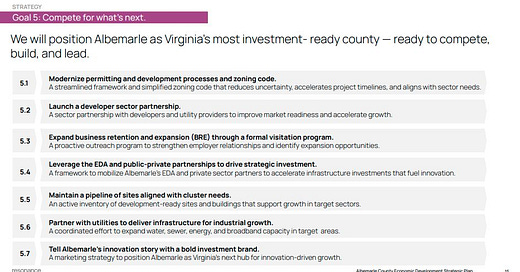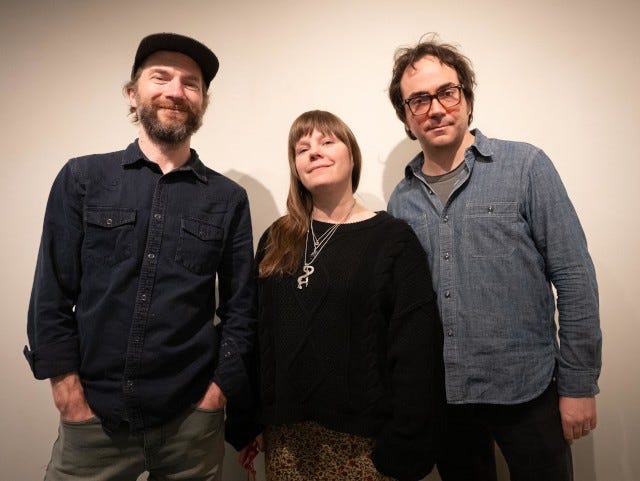June 16, 2025: Albemarle Supervisors briefed on the county’s next economic strategic plan
Plus: A look at local races in tomorrow’s party primaries in Virginia
There are many significant events from United States history today. On June 16, 1858, Senatorial candidate Abraham Lincoln gave his House Divided speech as he accepted the Republican nomination. In 1897, a treaty was signed that annexed the Republic of Hawaii. In 1933, the National Industrial Recovery Act went into effect. Closer to the now, Donald Trump announced his candidacy for the presidency ten years ago today.
Charlottesville Community Engagement covers matters in the present but this work flows from the past. A major goal of the newsletter is to help people think about the future. What will be remembered of this now a hundred years from now? I’m Sean Tubbs, and imagining the possibilities leads me to a place of hope.
In today’s installment:
One last look at local races before party primaries are held tomorrow in Virginia
The Virginia Department of Environmental Quality has lifted all drought advisories in the Commonwealth
A regional transportation body will be briefed tomorrow on another regional plan intended to reduce vehicle miles traveled
Albemarle Supervisors learn how residential development generates additional need to pay for services for residents
Albemarle Supervisors also get a briefing on a new economic development strategic plan
First-shout: Charlottesville Jazz Society to present Skullcap on June 20, 2025
On June 20, 2025, the Charlottesville Jazz Society will present the band Skullcap at Belmont Arts Collaborative on Carlton Road are available online.
The group takes their name from an herb used in indigenous medicine that is used to ease depression or anxiety. Their debut album, Snakes of Albequerque on Cuneiform Records, combines jazz, rock, and free improv to form a memorably tuneful kind of road movie soundtrack. The music navigates wildly different terrain from Tennessee to Monterey to New Mexico.
Tickets to see Skullcap at Belmont Arts Collaborative on Carlton Road are available online. The cost is $22 General Admission, $18 for paid supporters of The Charlottesville Jazz Society.
All seats at the door will be $25. For more information visit Cvillejazz.org or call 434-249-6191. Listen for Skullcap’s music on WTJU jazz programs.
In-person primary voting is tomorrow
The early voting period for tomorrow’s party primaries in Virginia is now over and election officials across the Commonwealth are preparing for tomorrow’s in-person vote.
As of Sunday, 189,087 early ballots have been cast in the Democratic primary according to information compiled by the Virginia Public Access Project. That compares to 15,477 in the Republican primary.
In the Thomas Jefferson Planning District, only Greene County has a Republican primary. That’s because there is a contested race to replace Delegate Nick Freitas in the 62nd House District. Freitas opted to not seek another term. Republicans Clay Jackson and Karen Hamilton are vying for the nomination.
Jackson, the chair of the Madison County Board of Supervisors, raised $25,755 between April 1 and June 5 according to campaign finance reports compiled by VPAP. Hamilton, a small business owner, raised $22,591.
Learn more about that race in this story by Charlottesville Tomorrow.
As of Sunday, 479 people in Greene had cast ballots in the Republican primary compared to 466 in the Democratic primary.
Democrats have contested seats for both Lieutenant Governor and Attorney General, whereas Republicans have already identified their nominees so there’s no need for a statewide primary. There are primaries in various races for the General Assembly or local office.
In Albemarle, 3,758 votes have been cast in the Democratic Primary through Sunday. In addition to the state-wide races, there is a primary in the Jack Jouett District for a nominee to replace Diantha McKeel. The two candidates are Sally Duncan and David Shreve.
Here are some resources to learn more about that race:
Q&A with the two candidates vying for Albemarle County Board of Supervisors’ Democratic nomination in Jack Jouett District, Charlottesville Tomorrow, May 1, 2025
Candidates for Jack Jouett Seat talk affordable housing, economy during forum, Maggie Glass, WVIR 29News, May 22, 2025
Jack Jouett District candidates square off at Free Enterprise Forum, Sean Tubbs, C-Ville Weekly, May 30, 2025
Duncan outraises Shreve in Jack Jouett District, Sean Tubbs, Information Charlottesville, June 11, 2025
Duncan, Shreve meet in primary to replace longtime Albemarle supervisor, Hannah Davis-Reid, VPM News, June 13, 2025
You can view the Free Enterprise Forum event here:
In Charlottesville, there is a three-way race for two Democratic nominations for City Council. Challenger Jen Fleisher is running against two incumbents who are running a joint campaign. They are Brian Pinkston and Juandiego Wade.
This will be the first time ranked-choice voting has been used by the city government to decide a nominee.
So far, 2,663 people have voted in Charlottesville as of Sunday.
If you are a voter in the Buford precinct, your polling place has been temporarily moved to the Tonsler Community Center. Read this story to learn why.
For more on that race, consult these resources:
Charlottesville is gearing up for its first election using ranked choice voting, Catie Ratliff, C-Ville Weekly, March 28, 2025
Q&A with three candidates seeking two Democratic nominations for Charlottesville City Council, Charlottesville Tomorrow, May 1, 2025
Charlottesville council candidates talk housing, zoning, priorities at forum, Maggie Glass, WVIR 29News, May 29, 2025
Incumbents Pinkston and Wade outraise Fleisher in Council race, Sean Tubbs, Information Charlottesville, June 12, 2025
Watch the Free Enterprise Forum from May 28, 2025:
DEQ lifts drought advisories across Virginia
For the first time in nearly a year, no locality in the Commonwealth of Virginia is under a drought watch or drought warning.
“The past two weeks have brought plentiful rainfall over the entirety of the Commonwealth, further improving soil moisture and surface water flows within all major watersheds,” reads an announcement sent out by the Virginia Department of Environmental Quality.
Twelve localities in the Northern Virginia and Shenandoah zones were still under a drought watch as of the June 2 report of the Drought Monitoring Task Force. The last time there were drought advisories was in the June 20, 2024 report.
The information release notes that there are still a few wells across Virginia that are at below normal levels, but all major water supply reservoirs are at normal levels.
The next report will come out on July 8, 2025.

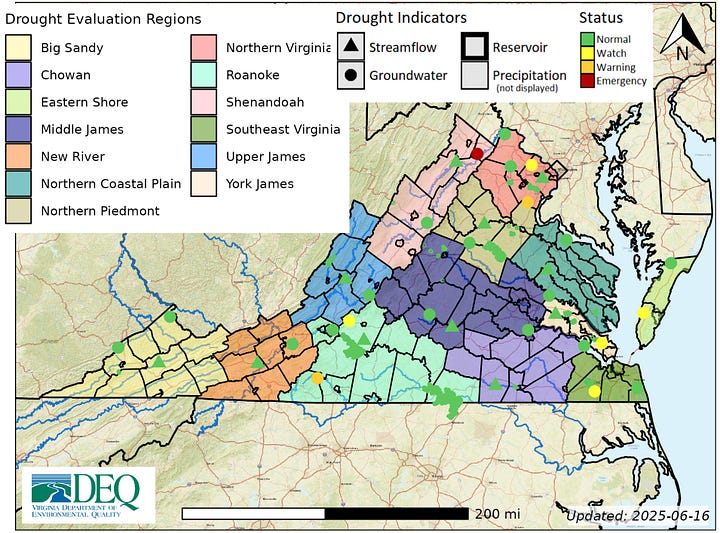
TJPDC seeking to craft new transportation demand management study
When it comes to planning for future transportation needs, there are many different players. In addition to individual planning conducted by the University and area localities, there is also the Metropolitan Planning Organization.
That body is mandated by the federal government to make local decisions about federal funding. The MPO is staffed by the Thomas Jefferson Planning District Commission and overseen by a Policy Board made up of voting members from Albemarle, Charlottesville, and the Virginia Department of Transportation.
A subcommittee of the MPO Policy Board will meet Tuesday morning and one of the items on the agenda is the creation of something called a “transportation demand management (TDM) study.”
The first task will be to review previous plans and the second task will be to create something called an “origin-destination” analysis. This is intended to provide a sense of where people go when they travel and why.
“Using data sources such as StreetLight, Census OnTheMap, and OpenStreetMap, CA-MPO staff will conduct an origin-destination analysis to understand travel coming in and out of the MPO area and traveling within the MPO area,” reads a draft scope of work for the study.
The MPO area consists of all of Charlottesville and urbanized sections of Albemarle County. It does not include the other localities in the TJPDC. The MPO-Tech Committee meets tomorrow at 10 a.m.
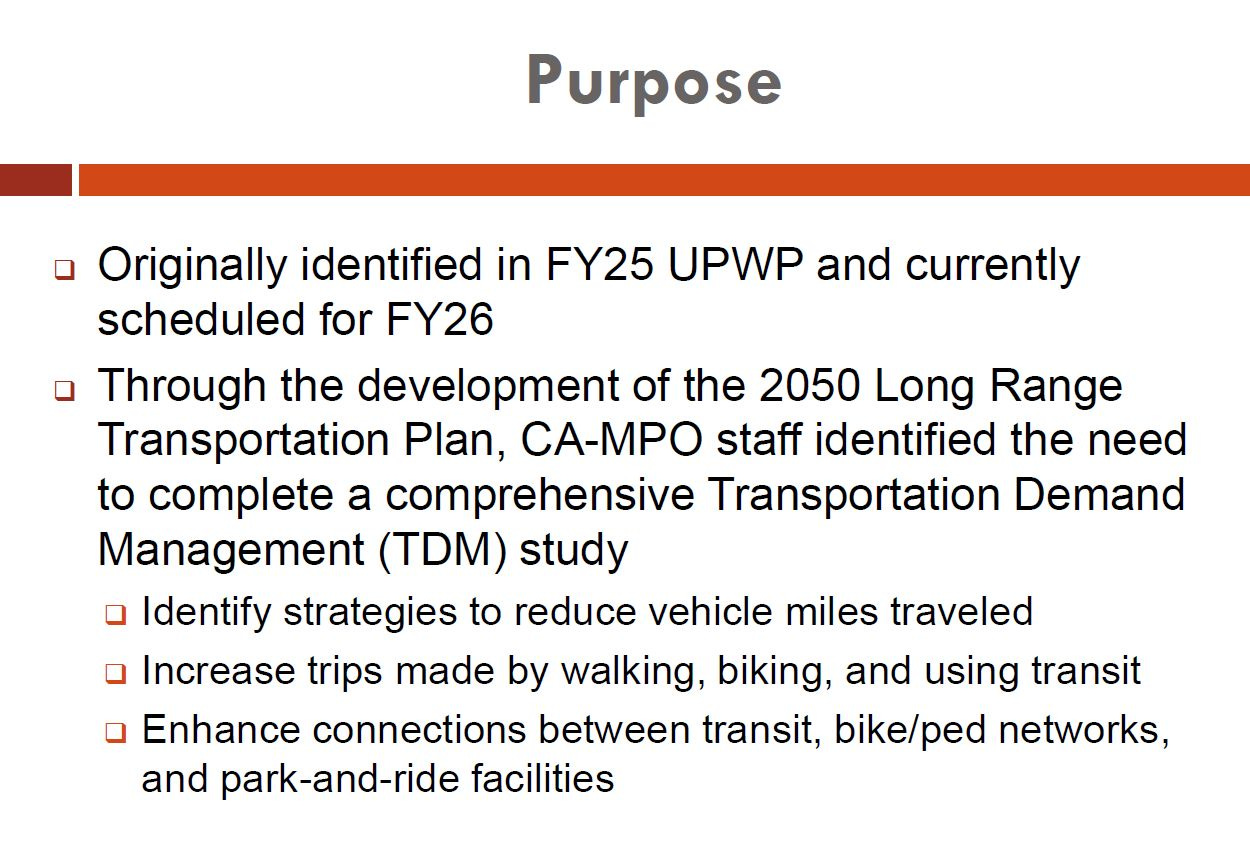
A third task is to recommend ways to encourage people to shift away from private cars to other forms of transportation. A fourth is to conduct a survey. All of this will be wrapped into a final report.
This newsletter is called “Charlottesville Community Engagement” to provide information that may be relevant to such studies. Here are some previous studies to consider.
The University of Virginia commissioned the firm VHB to conduct a Transportation Demand Management Plan in 2007. This is the same firm hired by Albemarle County to conduct the work for the Three Notched Trail. (read the 2007 UVA TDM report)
“Transportation Demand Management (TDM) is the art of influencing travel behavior for the purpose of reducing the demand for single occupant vehicle use,” reads the executive summary of the 2007 plan.
Implementation included increasing the cost of parking for UVA employees and making sure the University Transit System and shuttle systems could move people around the area.
In 2019, UVA published a Parking and Transportation Plan that sought to strengthen the TDM but also recognized new parking spaces would need to be built.
“The Plan recognizes that while TDM strategies can help to alleviate the parking issue, they need to be coupled with strategies that increase the amount and efficiency of the parking supply,” reads page 15 of the plan. “This change in the University transportation philosophy also requires changes in its parking policy and funding model.”
Since then UVA has planned to build at least two new parking garages which are now under construction as I reported last week. UVA has also invested in the Afton Express and offers free rides to those who agree to forgo a parking pass. I reported that earlier this month.
Charlottesville does not have a TDM plan in place, according to a transportation narrative included in the appendix of the 2021 Comprehensive Plan. This document does note that TJPDC provided TDM functions through its RideShare program.
“We offer free carpool matching, vanpool coordination, and operate a Guaranteed Ride Home program to provide free rides home in an emergency,” reads the RideShare website. “RideShare also works with employers to develop and implement traffic reduction programs, and we market the region’s Park and Ride lots.”
Albemarle’s Comprehensive Plan is now ten years old having been adopted on June 10, 2015. The transportation chapter encouraged continued participation with RideShare and the MPO.
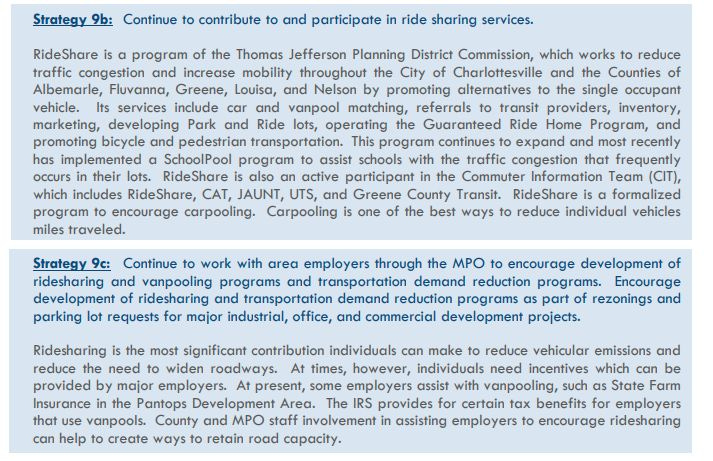
Albemarle Supervisors briefed on study of how much each type of land costs the county
There were a lot of big ideas discussed at the May 21, 2025 meeting of the Albemarle Board of Supervisors.This newsletter has summaries of two of them and others will hopefully follow later this week.
For decades, the county has had a close eye on growth and implemented policies in the early 1980’s to limit where development could go.
One of the work sessions that afternoon was to review a report known as a Cost of Community Services Study that calculates how much the county spends to provide services for different kinds of zoning districts and how much real estate tax is collected for each category.
“You assign revenue and expenditures to particular land uses and you compute that ratio,” said
Terry Rephann, a regional economist with the Weldon Cooper Center for Public Service at the University of Virginia.
Albemarle’s latest version was produced in late 2023 after the county asked for additional information to help inform the Comprehensive Plan update.
These studies were initially conducted by a nonprofit called the American Farmland Trust who wanted to demonstrate that residential development costs more for localities because people demand more services than open space.
The Weldon Cooper Center began doing them in the mid 2000’s. Rephann cautioned that these are snapshots of a point in time.
“For instance, we're not saying all housing is going to be a fiscal deficit for you,” Rephann said. “There could be ones that are very, very good in terms of generating more revenue than expenditures.”
Data for the 2023 study is based on the county’s audited books for 2022, officially known as the Comprehensive Annual Financial Report. (take a look here)
For that year, residential land brought in over $264.8 million in revenue, or 70.18 percent of the total tax receipts. The county spent over $346.7 million in services, or 90.11 percent of total expenditures.
Commercial brought in 27.32 percent of revenues or over $103 million. Services provided cost nearly $33 million, or 8.57 percent.
Agricultural and open space brought in $9.42 million but only cost $5.06 million in services.
Rephann said the biggest factor for why residential costs so much is the need to provide a public education for students from kindergarten to 12th grade.
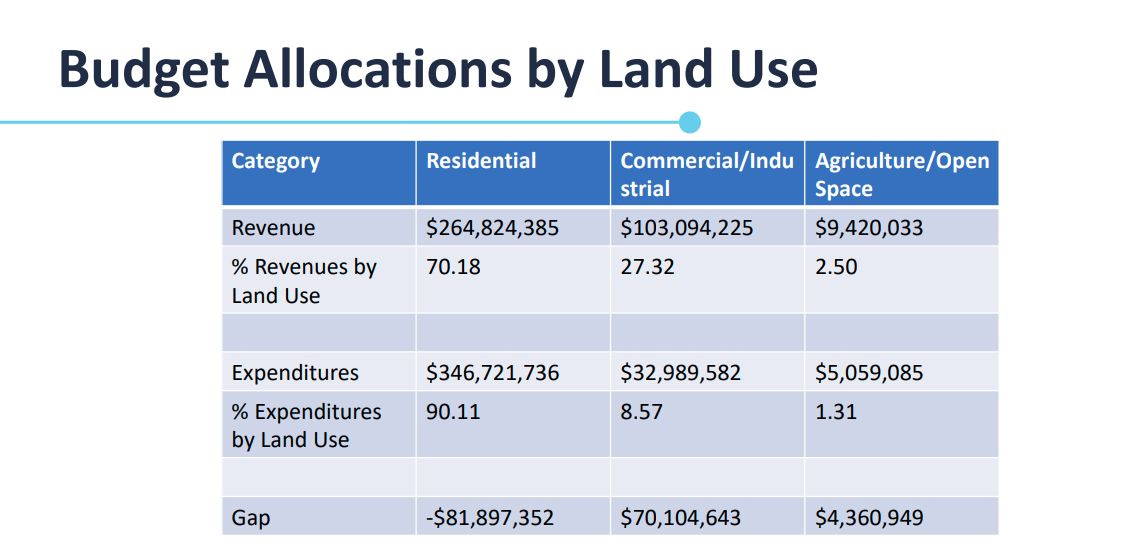
Supervisor Bea LaPisto-Kirtley said the information is helpful as it shows that more people moving here will mean larger budgets.
“People will say, well, build more houses,” LaPisto-Kirtley. “Okay, that's good. We do need more housing, but then that also costs us more in services. So people just need to understand that.”
This particular study does include any information about the role the University of Virginia plays. UVA is primarily in Albemarle County but does not directly contribute tax revenue. Rephann said there’s not a lot of objective data, but the role of UVA is significant.
“People are in Albemarle county, retire here because of their connections to the University,” Rephann said. “So it's one of the things that drives up your housing costs, makes housing less affordable, but also contributes more.”
Rephann said there are many amenities that drive the economy such as provide consumers in the form of students. He said if UVA disappeared, other economic development factors would also vanish.
“What's going to happen to the commercial businesses that are supported by the students?” Rephann said. “And so there are these indirect spin off effects, these tax revenues that are contributed, faculty, staff, students supporting spin off businesses that come out of the Licensing Ventures group, et cetera, wouldn't be there anymore and so forth.”
For more details on how UVA-related entities pay Albemarle, there’s this story from March 27, 2024.
To watch the presentation on the Cost of Services Study, here’s a link to the video of the full meeting. You should be able to scroll through the interface to get to the meeting item you want.
Second shout-out: Plant Virginia Natives
Spring is almost here and perhaps there’s there’s still time to plan for upgrades to your outdoors. I’m not sure because I am not a gardener, and my yard is overrun! I suspect some of them are invasives!
If I knew how to do anything other than write, I could consult Plant Virginia Natives to figure my way out of my predicament.
Plant Virginia Natives is part of a partnership with ten regional campaigns for ten different ecosystems across Virginia, from the Northern Piedmont to the Eastern Shore. Take a look at the full map below for the campaign for native species where you are in the Commonwealth. For the Charlottesville area, download a free copy of the handbook: Piedmont Native Plants: A Guide for Landscapes and Gardens.
Albemarle Supervisors briefed on economic development plan
For many years, Albemarle’s growth management policy included a certain resistance to formal economic development efforts by the county. That began to change in 2010 when a Republican majority on the Board adopted an economic vitality action plan at the first board meeting that year.
Five years later, the county hired its first economic development director, then a second one, and then adopted an economic development strategic plan called Project Enable. This year the county is putting together an update. The Board of Supervisors got a briefing on May 21.
“This is the culmination of a lot of data analysis and also a lot of conversations in the community with stakeholders, business owners, people working in the workforce development space, education partners, even some of our regional partners,” said Emily Kilroy, the fourth person to serve as economic development director for Albemarle.
The county has hired the firm Resonance to conduct the work and the Board got to review some of the draft material. They’ll have a meeting with the Economic Development Authority in August. Steven Pedigo with Resonance said Albemarle is drafting this plan from a position of strength.
“We're not working on an economic development plan for a community that's in decline,” Pedigo said. “We're not even working on an economic development plan for a community that's really stagnated. There is a lot of momentum happening in the county that really sets us up to do really outstanding work together.”
Pedigo said strengths include the University of Virginia and the county’s investment in the Rivanna Futures project. He said the draft plan has five goals that seek to advance this mission statement.
“Albemarle County, we're rooted in innovation,” Pedigo said. “We are open for investment. We are a destination for entrepreneurs, makers, growers and thinkers where bold ideas take root, businesses scale and partnerships thrive. All with the idea that we are going to lead the way in Virginia's next innovation economy.”
The five goals call for a focus on the intelligence sector, biotechnology, agribusiness, entrepreneurs in the area, and to prepare for investment for outside areas.
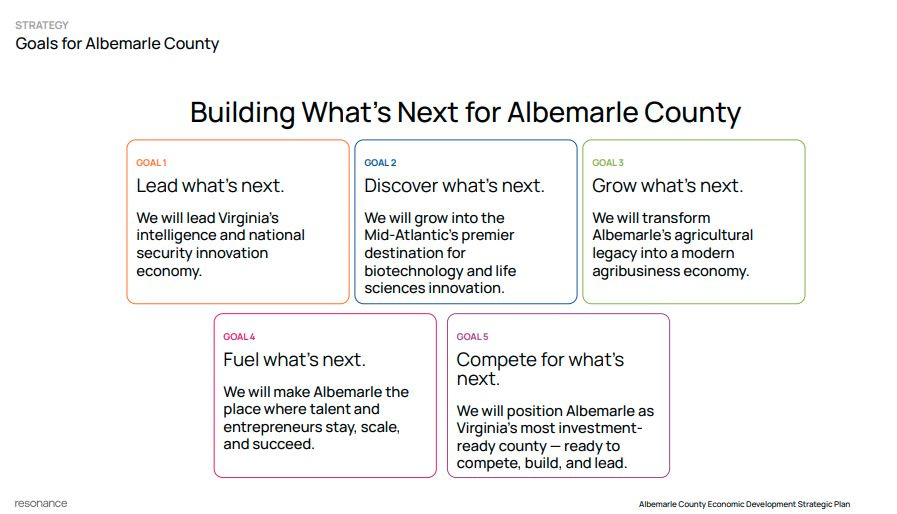
Metrics would include the number of jobs created, but also seeking to increase the number of people who are between the ages of 25 and 44.
Part of the process has included private meetings with Supervisors. Pedigo said many of them stressed the need to increase the commercial tax base.
“We've heard from you all, we heard from our stakeholder groups, we heard in almost every roundtable, is being really sure that we're kind of focusing in on this growth of our commercial share of our property tax base,” Pedigo said. “So looking about trying to bring some resiliency to the way that we are thinking about our tax base where we're not so overly heavily reliant on residential taxes.”
Each goal has several strategies and many of them touch on the need for workforce development to provide careers for people who live here.
“If you care about workforce development, Life sciences is actually a really great sector to do that because a lot of the downstream work that comes in the scaling of those businesses can create family wage creating supporting jobs and if we can create the space where those products and services can be made locally,” Pedigo said.
Goal 5 is one that seeks to make it easier for businesses to expand or relocate. That means a “simplified” zoning code and a “streamlined” permitting process, as well as increased use of public-private partnerships to build infrastructure.
Supervisor Michael Pruitt said he wanted to make sure the economic development plan was about creating opportunities for everyone and not just about making more money for people at the top. He said he would want to see more investment into companies like Afton Scientifc who announced a major expansion last October.
“Afton overwhelmingly is employing quite a lot of high quality career wage jobs that are enterable at kind of an [entry] level,” Pruitt said. “Maybe they want some tech certificates that they might be able to get at [Piedmont Virginia Community College], but really things that don't require a college degree but are still professional career jobs.”
On the subject of agribusiness, Pruitt said many in the rural area might have input on Strategy 3.1 which reads “Updated tools to support flexible agribusiness operations, value-added production, and agricultural technology enterprises.”
“I need to hear what the horse estates think about this,” Pruitt said. “I need to hear what the Farm Bureau thinks about this. And I don't know that they're blowing up my phone yet because I'm not sure it's on their radar.”
Supervisor Ann Mallek said she wanted more information about what it means to have a “modernized agribusiness economy.”
“What does that mean?” Mallek asked. “Are we talking about the local food direct to consumer, which we've been working, working very hard on since 2010, or something else?”
Kilroy said that some stakeholders currently have to ship their goods in order to process them into something that can be sold to the consumer.
“Some of the ag businesses described when we were sitting down with them at a roundtable that for them to be able to scale their business having, they need some light industrial type facilities that the current zoning code does not allow in the rural area where their business is located,” Kilroy said.
Supervisor Bea LaPisto-Kirtley said she would support the agribusiness sector by helping to support the wine industry. That might involve shifting Albemarle county’s rules.
“I think we need to be flexible and maybe in certain circumstances for maybe using a special use permit, but being able to get restaurants into a couple of these wineries,” LaPisto-Kirtley said. “Everyone's heard me on that before. That's because it will bring in millions of dollars.”
Supervisor Diantha McKeel said she could see the concern on some people’s faces in the audience as Pedigo went through the various strategies.
“And I see those same concerns when I go out into the public and talk about economic development and diversifying our tax base,” McKeel said. “And I think it's really going to be important. Important for us to talk about why… economic development is important. They don't always connect because for many people in our community, they're very satisfied, they're very happy, they don't see any need to change. And I think there are many other people in our community who aren't able to live in our community.”
McKeel said one big obstacle to people wanting to relocate here is the cost of childcare. She also said she is concerned about the long-term health of tourism given the drop in international visitors since the beginning of the second presidency of Donald Trump.
How will it all play out? Keep reading Charlottesville Community Engagement to see what I can write out.
Reading material for #880
One injured, one arrested, one wanted after downtown Charlottesville shooting, Forrest Holt, WVIR 29NBC, June 14, 2025
A cornerstone of Charlottesville says goodbye, Malaika Rehman, Cavalier Daily, June 14, 2025
Supervisors honor retiring employees, Heather Michon, Fluvanna Review, June 15, 2025
‘We all have a voice’ Charlottesville protestors stand against Trump admin, Gabby Womack, WVIR 29 News, June 15, 2025
Construction costs jump at a 6% annualized rate, Sebastian Obando, Construction Dive, June 16, 2025
Funding upheaval leaves GRRP recipients in limbo, Mary Salmonsen, Multifamily Dive, June 16, 2025
#880 salutes the 20th anniversary of Charlottesville Tomorrow
Is this newsletter really realistic? Is it really commercially viable? Can I translate the past five years of work into something lasting?
I’ll note that the organization I used to work for turns 20 today according to an entry on cvillepedia as well as my memory. I’m trying to confirm that date but I remember I skipped the press conference I had been invited to attend. I later interviewed the founder, but I have a suspicion it never made it anywhere.
Twenty years ago today, I was a freelance reporter who brought some of his living by selling public radio stories. I created the Charlottesville Podcasting Network to experiment but several elements to make money where missing.
I worked at Court Square Tavern at the same time. At that time, the place was busy and I worked as much as I could to help make ends meet. The person I was with at the time was expecting a child and so I stayed here.
In the spring of 2006, Court Square Tavern caught on fire and I was out of work. I hustled to try to make up the difference, but by the spring of 2007 it was clear I needed something more substantial. This was around the time the public radio station hired a full-time reporter and the freelance money dried up.
When I got hired at Charlottesville Tomorrow, I had to give up all of my entrepreneurial work. I was not allowed to freelance.
I hustled at Charlottesville Tomorrow. I worked long hours to try to make sure that we made a name for ourselves. I gave up a lot of my time to ensure our stories made it in the Daily Progress back when they were a daily.
When I split up from my children’s mother at the end of 2008, the founder told me “well, at least you have a job.”
I threw everything into the work, but it was still never enough to pay my bills. I went back to work at Court Square Tavern. I worked weekends as a catering server. I learned no management or business skills.
After the founder left suddenly, the Board of Directors wanted to go in a different direction. The day after his plans were known, a Board member told me I had no shot at taking over. It was clear all of my hustle bought me no stake in the organization. I left over a difference of journalistic philosophy.
Now I work seven days a week because I want to build equity. I care deeply about this work and the mission that was embedded into me when I started in 2007. It feels important for me to provide a long view of planning.
What will the future hold? For me that means planning for this week’s set of stories, while also working to bring in more revenue. Some days I’m optimistic. Some days I’m really dire.
I am glad Charlottesville Tomorrow is twenty and able to fulfill their mission. All of my stories are still there even if I gripe about them being “uncategorized.”
Will Town Crier Productions make that milestone? We’ll see. I’ll just stick to the work and hope for the best.

